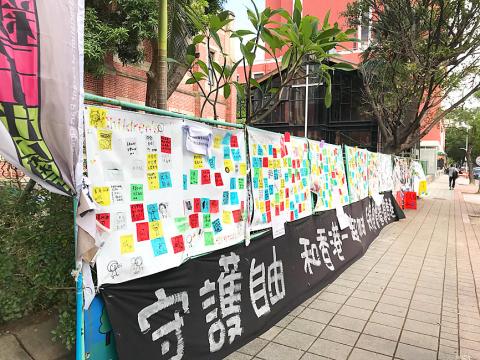About 80 percent of Hong Kongers said that pro-democracy protests in the territory led them to think that the “one country, two systems” framework is not feasible, the results of a poll released yesterday showed.
A total of 93.6 percent said that if the protests are not effective, it would mean the “one country, two systems” formula had failed.
Chinese University of Hong Kong professor Francis Lee (李立峯) announced in Taipei the results of the survey he and a team of researchers conducted about the “one country, two systems” formula.

Photo: CNA
Lee and other academics at the university’s Centre for Communication and Public Opinion Survey conducted interviews by telephone and on location during the protests.
The survey, which was the latest of several similar polls conducted since 2016, asked people if they supported keeping the “one country, two systems” framework after 2047, handing full control of Hong Kong to Beijing, or seeking independence.
In previous similar surveys, about 60 percent said that they wanted the formula to continue to be used beyond 2047, when Beijing’s promise to respect the territory’s autonomy is to expire.
The majority of those who wanted independence were aged 15 to 24, while older respondents desired “stability,” Lee said.
About 60 percent said that if the protest movement succeeds, it would be possible to fix the shortcomings of the formula.
The results showed that independence is not the unifying force behind the protests, Lee said.
The protests are an implement for change and if they are used to push for independence, the Chinese Communist Party would not hesitate to quash all protest movements in the territory, he said, adding that the protesters would also lose international support.
A separate survey found that the protesters come from more diverse age groups and social classes than the 2014 “Umbrella movement.”
That survey was conducted by Lingnan University assistant professor Yuen Wai-hei (袁瑋熙), who interviewed more than 16,000 people at 25 protest locations in the territory.
Protesters’ demands have changed significantly between June and August, when they started to call for independent investigations into alleged police brutality, he said.
Respondents said that Hong Kong Chief Executive Carrie Lam (林鄭月娥) stepping down would not make a big difference.

CROSS-STRAIT COLLABORATION: The new KMT chairwoman expressed interest in meeting the Chinese president from the start, but she’ll have to pay to get in Beijing allegedly agreed to let Chinese Nationalist Party (KMT) Chairwoman Cheng Li-wun (鄭麗文) meet with Chinese President Xi Jinping (習近平) around the Lunar New Year holiday next year on three conditions, including that the KMT block Taiwan’s arms purchases, a source said yesterday. Cheng has expressed interest in meeting Xi since she won the KMT’s chairmanship election in October. A source, speaking on condition of anonymity, said a consensus on a meeting was allegedly reached after two KMT vice chairmen visited China’s Taiwan Affairs Office Director Song Tao (宋濤) in China last month. Beijing allegedly gave the KMT three conditions it had to

STAYING ALERT: China this week deployed its largest maritime show of force to date in the region, prompting concern in Taipei and Tokyo, which Beijing has brushed off Deterring conflict over Taiwan is a priority, the White House said in its National Security Strategy published yesterday, which also called on Japan and South Korea to increase their defense spending to help protect the first island chain. Taiwan is strategically positioned between Northeast and Southeast Asia, and provides direct access to the second island chain, with one-third of global shipping passing through the South China Sea, the report said. Given the implications for the US economy, along with Taiwan’s dominance in semiconductors, “deterring a conflict over Taiwan, ideally by preserving military overmatch, is a priority,” it said. However, the strategy also reiterated

‘BALANCE OF POWER’: Hegseth said that the US did not want to ‘strangle’ China, but to ensure that none of Washington’s allies would be vulnerable to military aggression Washington has no intention of changing the “status quo” in the Taiwan Strait, US Secretary of Defense Pete Hegseth said on Saturday, adding that one of the US military’s main priorities is to deter China “through strength, not through confrontation.” Speaking at the annual Reagan National Defense Forum in Simi Valley, California, Hegseth outlined the US Department of Defense’s priorities under US President Donald Trump. “First, defending the US homeland and our hemisphere. Second, deterring China through strength, not confrontation. Third, increased burden sharing for us, allies and partners. And fourth, supercharging the US defense industrial base,” he said. US-China relations under

The Chien Feng IV (勁蜂, Mighty Hornet) loitering munition is on track to enter flight tests next month in connection with potential adoption by Taiwanese and US armed forces, a government source said yesterday. The kamikaze drone, which boasts a range of 1,000km, debuted at the Taipei Aerospace and Defense Technology Exhibition in September, the official said on condition of anonymity. The Chungshan Institute of Science and Technology and US-based Kratos Defense jointly developed the platform by leveraging the engine and airframe of the latter’s MQM-178 Firejet target drone, they said. The uncrewed aerial vehicle is designed to utilize an artificial intelligence computer